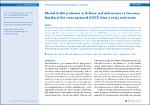Mental health problems in children and adolescents in Germany. Results of the cross-sectional KiGGS Wave 2 study and trends
Klipker, Kathrin
Baumgarten, Franz
Göbel, Kristin
Lampert, Thomas
Hölling, Heike
Mental health problems in children and adolescents are associated with individual and family-related constraints as well
as social costs. 20.0% of children and adolescents showed mental health problems at the KiGGS baseline study
(2003-2006). This study investigates the current prevalence for KiGGS Wave 2 (2014-2017) as well as time trends in
comparison with the KiGGS baseline study. Mental health problems were assessed for 3- to 17-year-old children and
adolescents by using the parent-based version of the Strengths and Difficulties Questionnaire (SDQ). For KiGGS Wave
2, the prevalence of mental health problems was 16.9%. A decreasing trend is pronounced particularly among boys
between 9 and 17 years of age. Mental health problems are displayed more frequently by girls and boys from families
with a low socioeconomic status compared to their peers from families with a medium or high socioeconomic status.
These findings are discussed in the light of various measures and actions in health promotion and health care.
Files in this item

